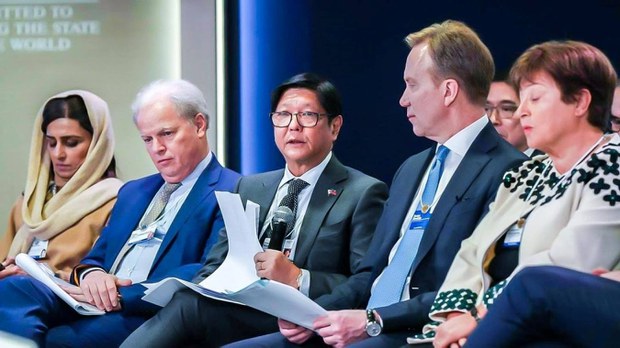Marcos to Davos forum: Entered politics to cleanse family’s name
2023.01.19
Manila
 Philippine President Ferdinand Marcos Jr. (third from left) joins other participants during the High-Level Dialogue on Investing in Infrastructure and Resilience at the World Economic Forum (WEF) in Davos, Switzerland, Jan. 18, 2023.
Philippine President Ferdinand Marcos Jr. (third from left) joins other participants during the High-Level Dialogue on Investing in Infrastructure and Resilience at the World Economic Forum (WEF) in Davos, Switzerland, Jan. 18, 2023.
Philippine President Ferdinand Marcos Jr. told the World Economic Forum in Switzerland that he entered politics to cleanse his family’s name after a popular revolt in 1986 ended his father’s nearly two-decade dictatorship.
This was the first time Marcos raised the issue before an international audience and in a country where, critics say, his late namesake father stashed away millions of dollars that his regime had plundered from the Filipino people.
Marcos told Forum President Børge Brende in Davos that he lost interest in a political life when his father, Ferdinand E. Marcos, died in a Hawaiian exile in 1989.
“[A]fter we came back from the United States, after exile, when we were first allowed to come back, the political issue was Marcos,” he said during an on-stage conversation with Brende on Wednesday.
“And … for us to defend ourselves politically, somebody had to enter politics and be in the political arena. So that at least, not only the legacy of my father but even our own survival required that somebody go into politics.”
During his election campaign and after he won the presidency last May, Marcos defended his father’s 1972 martial law proclamation and tenure. During that period, according to Amnesty International, 70,000 people were imprisoned, 34,000 tortured and more than 3,200 killed.
Marcos Jr. has said martial law was necessary back then because the Philippines was facing national security threats from communist rebels as well as separatist guerrillas in the south.
A former congressman, Marcos served from 1998-2007 as governor of the northern Philippine province of Ilocos Norte for three consecutive terms. He was again elected to Congress in 2007, and to the Philippine Senate in 2010.
In 2016, he ran as vice president but lost to Leni Robredo.
Marcos then set his sights on the presidency.
“Well … Every lieutenant wants to be a general, right? Every clerk wants to be the CEO. So I’m saying if I’m going to be in politics, let’s do the best we can and take it as far as we can take it,” he said.
His family is now back in the business of politics. His sister, Imee, is a sitting senator. His son is a member of the House of Representatives, which is led by his uncle.
South China Sea issue
During his discussion with Brende, the Philippine leader also said that his government’s foreign policy focus was on peace and securing national interests amid heightened tensions with Beijing over the disputed South China Sea.
The South China Sea issue “keeps you up at night, keeps you up in the day, keeps you up most of the time,” Marcos said.
“We are at the very frontline. .... If something goes wrong here, we are going to suffer. And that’s why the – when asked what is your foreign policy and how would you describe it, I say, it’s a commitment to peace and a very – very, very close – and guided very, very closely by our national interest as I mentioned before.”
China claims nearly all of the South China Sea on historical grounds, including waters within the exclusive economic zones of Brunei, Malaysia, the Philippines, Vietnam, and Taiwan. Beijing also claims historic rights to areas of the waterway that overlap Indonesia’s exclusive economic zone.
Beijing has ignored a 2016 international arbitration court ruling that Manila won and that invalidated China’s vast claims in the South China Sea.
Marcos has repeatedly stated that his government would assert the ruling, and he reiterated that in an interview with Bloomberg News.
“That is the red line. That is something that will not move. It’s something that we cannot cross because it’s a very slippery road from there,” Marcos told Bloomberg.
“That’s a difficult thing to have to do because the impasse, really, has occurred in the application of the law. Both sides say that this area belongs – we say it is the maritime territory of the Philippines, and, of course, China says the same.”
Jeoffrey Maitem and Dennis Jay Santos in Davao City, southern Philippines, contributed to this report.







